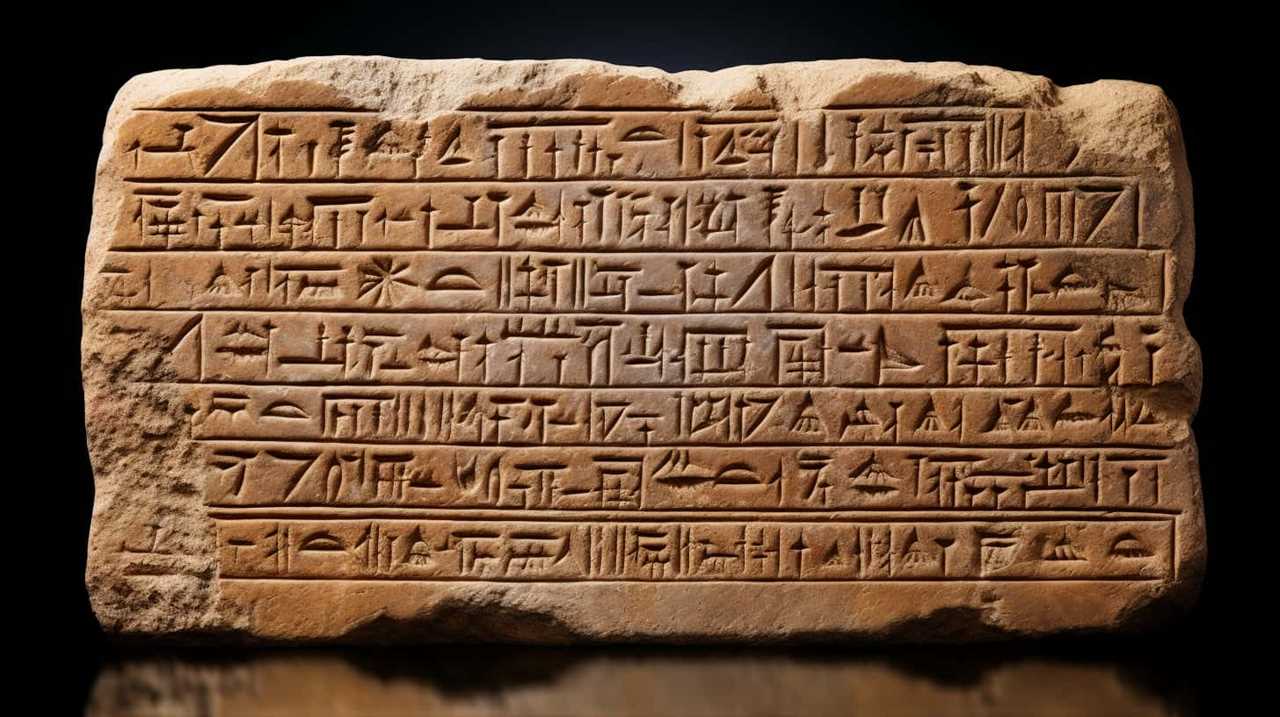When we study Confucianism, we uncover the deep wisdom found in ‘Confucian Quotes: Honoring Family Bonds in Antiquity.’ These eternal words provide valuable perspectives on the importance of family in ancient China.
With filial piety as its cornerstone, Confucianism emphasizes the utmost respect and reverence for our ancestors and elders. Within the family, harmony is cultivated, striking a delicate balance between individuality and our obligations to our kin. Roles and responsibilities are defined, guiding our conduct and moral development.
Through education and the passing down of values, Confucianism shapes the very fabric of our society. Join us as we unravel the intricate tapestry of gender roles and family dynamics, and discover the enduring legacy of Confucian values.
Key Takeaways
- Family plays a crucial role in shaping values, relationships, and a sense of belonging in Confucianism.
- Rituals are essential for maintaining harmony and order within the family, as well as showing respect and gratitude towards ancestors.
- Filial piety, which involves respect, care, and responsibility towards parents and elders, is a foundational virtue in Confucianism.
- Ancestor worship and rituals are significant in honoring and remembering ancestors, providing guidance and wisdom, and reinforcing family bonds and continuity.
The Importance of Family in Confucianism
Family holds immense significance in Confucianism, shaping our values, relationships, and sense of belonging.

In Confucianism, the role of rituals in family life is crucial. Rituals are seen as a way to maintain harmony and order within the family unit. They serve as a means of showing respect and gratitude towards our ancestors, as well as fostering a sense of unity and connection among family members. Through these rituals, we learn about our family history, values, and traditions, which in turn shape our own identities.
One key concept in Confucianism is filial piety, which refers to the respect and devotion that children have towards their parents and elders. In modern society, the concept of filial piety continues to hold significance, albeit in a different context. While traditional family structures may have evolved, the values of respect, care, and responsibility towards our parents and elders remain important. Filial piety isn’t limited to just fulfilling our basic obligations towards our parents, but also involves maintaining strong relationships and providing emotional support.
Filial Piety: A Foundational Virtue
As we explore the subtopic of ‘Filial Piety: A Foundational Virtue’, we encounter several key points that shed light on the significance of this virtue in Confucianism.
Firstly, the role of ancestors holds great importance, as filial piety involves honoring and respecting one’s ancestors through rituals and remembrance.

Additionally, cultural obligations and traditions play a crucial role in shaping the practice of filial piety, as they provide a framework for individuals to fulfill their familial responsibilities.
Role of Ancestors
Honoring the role of ancestors as a foundational virtue is essential in upholding filial piety within Confucian philosophy. Ancestor worship and the performance of ancestral rituals are deeply ingrained in the Confucian tradition, symbolizing the importance of maintaining a strong connection with one’s ancestors. These practices serve as a means of expressing gratitude, respect, and reverence towards those who came before us, recognizing their contributions and sacrifices that have shaped our lives. By honoring our ancestors, we acknowledge the intergenerational bonds that tie us together and affirm our commitment to preserving familial harmony and continuity. This emphasis on filial piety, rooted in reverence for our ancestors, strengthens family values, fosters moral development, and cultivates a sense of duty and responsibility towards our lineage. Through these ancestral practices, we not only honor our past but also shape our present and future.
| Ancestor Worship | Ancestral Rituals |
|---|---|
| – A form of veneration and respect towards ancestors. | – Rituals performed to honor and remember ancestors. |
| – Involves offerings, prayers, and ceremonies. | – Can include ancestral tablets, altars, and memorial services. |
| – Symbolizes gratitude, reverence, and filial piety. | – Reinforces family bonds and continuity. |
| – Demonstrates the importance of ancestral guidance and wisdom. | – Emphasizes the intergenerational connection and moral responsibilities. |
Cultural Obligations and Traditions
We must recognize and embrace our cultural obligations and traditions, as they’re integral to upholding the foundational virtue of filial piety within Confucian philosophy.
Cultural customs and traditional practices play a crucial role in shaping our values and strengthening family bonds. These customs and practices provide a framework for understanding our roles and responsibilities within the family unit.

Filial piety, as a foundational virtue, emphasizes the importance of respecting and honoring our parents and ancestors. It’s through cultural customs and traditional practices that we express our gratitude, obedience, and reverence towards our elders.
These customs and practices serve as a guide for cultivating harmonious family relationships and maintaining societal order. By adhering to these cultural obligations and traditions, we not only preserve our cultural heritage but also contribute to the overall well-being of our families and communities.
Modern Interpretations and Relevance
Recognizing the enduring significance of filial piety, our cultural obligations and traditions provide a framework for understanding the modern interpretations and relevance of this foundational virtue.
In today’s world, the concept of filial piety has evolved to encompass not only respect and obedience towards parents, but also the care and support of elders, the preservation of family values, and the cultivation of harmonious relationships within the family unit.

Modern interpretations emphasize the importance of maintaining strong family bonds amidst the fast-paced and individualistic nature of society. Filial piety acts as a guiding principle that promotes empathy, compassion, and gratitude towards our parents and ancestors, reminding us of the sacrifices they made for us.
It serves as a moral compass that helps us navigate the complexities of modern life, allowing us to find balance between our individual aspirations and our obligations towards the family.
Respect for Ancestors and Elders
When it comes to Confucian philosophy, the respect for ancestors and elders holds immense significance.
Ancestor veneration isn’t only a way to honor our lineage but also a means of connecting with our past and understanding our roots.

Additionally, the wisdom and experience of our elders are highly valued, as they provide guidance and serve as role models for future generations.
Through respecting our ancestors and elders, we cultivate a sense of gratitude and appreciation for the knowledge and values they’ve passed down to us.
Ancestor Veneration Importance
One significant aspect of Confucian philosophy is the importance of ancestor veneration, which emphasizes the reverence and respect we hold for our ancestors and elders. This cultural practice of ancestor worship is deeply ingrained in Confucian teachings and plays a crucial role in shaping individuals and society.
The significance of ancestor veneration can be understood by considering the following three points:

- Preservation of family lineage: By honoring our ancestors, we acknowledge their contributions and sacrifices, ensuring the continuity of our family lineage. This practice reinforces the importance of family bonds and strengthens our sense of identity and belonging.
- Moral guidance: Ancestor veneration serves as a moral compass, reminding us of the values and virtues upheld by our ancestors. Their wisdom and experiences guide us in making ethical choices and leading virtuous lives.
- Gratitude and reciprocity: Showing respect and gratitude towards our ancestors cultivates a sense of reciprocity. As we receive the blessings and guidance from our ancestors, we’re inspired to pay it forward and create a positive impact on future generations.
Elders’ Wisdom Valued
We highly value the wisdom of our elders and hold deep respect for both our ancestors and current older generations. In modern society, the elders’ wisdom plays a crucial role in preserving family values and guiding the younger generations towards a fulfilling and righteous path.
The knowledge and experiences they’ve accumulated over the years are invaluable resources that help shape our understanding of the world and our place within it. By paying attention to their teachings and seeking their guidance, we can avoid repeating the mistakes of the past and make informed decisions that benefit not only ourselves but also our families and communities.
The elders’ wisdom serves as a bridge between the past and the present, ensuring that the values and traditions passed down through generations remain intact. Transitioning into cultivating harmony within the family, we recognize that this harmony is nurtured through the wisdom and guidance of our elders.
Cultivating Harmony Within the Family
To foster a harmonious family environment, it’s essential that we actively nurture and cultivate strong bonds through open communication and mutual respect. Maintaining familial harmony requires constant effort and dedication. Here are three key ways in which we can cultivate harmony within our families:

- Effective communication: Communication is the foundation of any healthy relationship, and it plays a crucial role in maintaining familial harmony. We must strive to openly express our thoughts, feelings, and concerns, while also actively listening to others. By promoting honest and respectful communication, we can prevent misunderstandings and conflicts from arising within the family.
- Empathy and understanding: Cultivating harmony within the family involves recognizing and appreciating the unique perspectives and emotions of each family member. We should strive to empathize with others, putting ourselves in their shoes and seeking to understand their point of view. This empathy and understanding can help build stronger connections and resolve conflicts more effectively.
- Mutual respect: Respecting one another’s boundaries, opinions, and choices is crucial in maintaining familial harmony. We must treat each family member with kindness, patience, and dignity. By valuing and respecting everyone’s individuality, we create an atmosphere of acceptance and love, fostering stronger family bonds.
Balancing Individuality and Family Obligations
Finding a balance between personal identity and fulfilling familial obligations can be challenging. It requires careful navigation of one’s own desires and aspirations while also upholding the cultural expectations and responsibilities placed upon individuals within their families.
In Confucian philosophy, the concept of balancing independence and family obligations is deeply ingrained. Confucianism emphasizes the importance of maintaining harmony within the family unit, which often involves sacrificing personal desires for the greater good of the family. However, this doesn’t mean that individuals must completely forfeit their own identities. Instead, Confucian teachings encourage individuals to find a middle ground where they can maintain their individuality while still fulfilling their family obligations.
Cultural expectations play a significant role in this delicate balancing act. In many traditional societies, there’s a strong emphasis on filial piety and the expectation that individuals will prioritize the needs and well-being of their families over their own desires. This can be particularly challenging for those who aspire to pursue their own dreams and goals outside of their familial responsibilities.
Achieving a balance between individuality and family obligations requires thoughtful reflection and self-awareness. It involves recognizing the importance of both personal fulfillment and familial harmony, and finding ways to reconcile these seemingly conflicting priorities. Through open communication, compromise, and a deep understanding of one’s cultural heritage, individuals can navigate the complexities of balancing independence and family obligations in a way that honors both their own identities and the bonds of their families.

Roles and Responsibilities in Confucian Family Ethics
Emphasizing the interconnectedness of family life, Confucian family ethics assign distinct roles and responsibilities to each member. These roles are based on gender, with men and women having different duties within the family structure. In Confucianism, men are expected to be the breadwinners and protectors of the family, while women are responsible for managing the household and raising children. This division of labor reflects the belief that each gender has its own unique strengths and contributions to make.
Education also plays a crucial role in Confucian family ethics. Parents are responsible for providing their children with a proper education, not only in academic subjects but also in moral development. They’re expected to instill the values of filial piety, respect, and obedience in their children from a young age. Education is seen as a means to cultivate virtuous individuals who’ll contribute to the well-being of society.
In Confucian family ethics, the responsibilities of each family member are interconnected and serve to maintain harmony within the family unit. By fulfilling their respective roles, family members contribute to the overall well-being of the family and society at large. The importance placed on gender roles and education underscores the significance of upholding traditional values and maintaining social order.
Education and Moral Development in the Family
During antiquity, we prioritized education and moral development within the family unit. Confucian teachings emphasized the importance of education as a means to cultivate personal virtues and contribute to the well-being of society. In the Confucian tradition, parents were seen as the primary educators, responsible for instilling moral values and guiding their children towards becoming virtuous individuals.

Education in the family wasn’t limited to academic knowledge but also encompassed the development of character and moral integrity. Confucius believed that individuals should strive to embody the virtues of benevolence, righteousness, propriety, wisdom, and faithfulness. These family virtues were considered essential for maintaining harmonious relationships within the family and the broader community.
Parents were expected to lead by example and create a nurturing environment that facilitated the moral development of their children. They were encouraged to cultivate a sense of respect, filial piety, and obedience towards elders. This emphasis on family virtues helped to foster a strong sense of social cohesion and harmony.
Furthermore, the Confucian teachings emphasized the importance of self-cultivation and continuous learning. Family members were encouraged to engage in self-reflection, study the classics, and seek wisdom from past sages. This pursuit of knowledge and moral development was seen as a lifelong journey, enabling individuals to continually improve themselves and contribute positively to society.
Gender Roles and Family Dynamics in Ancient China
In ancient China, the roles and dynamics within families were shaped by distinct gender expectations and societal norms. These expectations and norms heavily influenced marriage customs and inheritance traditions, which played a significant role in defining the gender roles and family dynamics of the time.

- Marriage customs: Marriage in ancient China wasn’t simply a union between two individuals, but rather a merging of two families. Marriages were often arranged by parents or matchmakers, with the primary goal being the preservation of family lineage and social status. Women were expected to be obedient wives and dutiful daughters-in-law, while men held the responsibility of providing for and protecting their families.
- Inheritance traditions: Inheritance in ancient China primarily followed the patrilineal system, where family wealth and property were passed down through the male line. This meant that sons were favored over daughters when it came to inheriting family assets. The emphasis on male inheritance reinforced the patriarchal structure of the society and perpetuated the subordinate position of women within the family.
- Gender roles and family dynamics: As a result of these marriage customs and inheritance traditions, the gender roles within families were clearly defined. Men held positions of authority and power, while women were expected to fulfill domestic responsibilities and carry on the family name through bearing sons. These societal expectations and norms shaped the dynamics within families, reinforcing the hierarchical structure and reinforcing traditional gender roles.
In exploring the gender roles and family dynamics of ancient China, it becomes evident that these customs and traditions had a profound impact on the lives of individuals within the society. These expectations and norms created a clear division of labor and power within families, perpetuating a patriarchal system that favored men and limited the agency of women. Understanding these historical dynamics allows us to reflect on the progress we’ve made and the work that still needs to be done to achieve gender equality today.
Transitioning into the subsequent section about ‘legacy and continuity: passing on Confucian values’, it’s essential to recognize how these gender roles and family dynamics influenced the transmission of Confucian values from one generation to the next.
Legacy and Continuity: Passing on Confucian Values
As we delve into the topic of ‘Legacy and Continuity: Passing on Confucian Values’, we can see how these gender roles and family dynamics greatly influenced the transmission of Confucian values from one generation to the next. In ancient China, passing on cultural heritage was of utmost importance, and Confucianism played a central role in shaping family values and traditions. Rituals and ceremonies were key in ensuring that these values were upheld and passed down through the generations.
| Rituals and Ceremonies | Role in Passing on Confucian Values |
|---|---|
| Ancestral Worship | Ancestral worship was a fundamental practice in Confucianism. It involved paying respects to ancestors, seeking guidance, and honoring their wisdom. This ritual served as a way to connect with the past and reinforce the importance of family bonds. By participating in ancestral worship, individuals learned to value their lineage and to carry on the legacy of their ancestors. |
| Coming-of-Age Ceremonies | Coming-of-age ceremonies marked the transition from childhood to adulthood. These ceremonies emphasized the importance of moral and ethical development. Young individuals were taught about their responsibilities to their family, society, and themselves. Through these ceremonies, Confucian values were instilled in the younger generation, ensuring the continuity of these principles. |
| Wedding Ceremonies | Wedding ceremonies in ancient China were more than just celebrations of love. They were also important events for passing on Confucian values. Weddings symbolized the union of two families and the continuation of ancestral lines. The rituals and customs performed during weddings emphasized the importance of filial piety, respect for elders, and the preservation of family traditions. |
| Funerals | Funerals in ancient China were elaborate affairs, filled with rituals and customs. They served as a way to honor the deceased and to show respect for their contributions to the family and society. These rituals reinforced the importance of filial piety and the continuation of family bonds even after death. Funerals provided an opportunity to teach younger generations about the values and virtues that their ancestors upheld. |
Through these rituals and ceremonies, Confucian values were deeply ingrained in the fabric of Chinese society. They served as a means of passing on cultural heritage from one generation to the next, ensuring the continuity of these values and principles. The role of rituals and ceremonies in transmitting Confucian values cannot be overstated, as they provided a tangible and meaningful way for individuals to connect with their past and shape their future.

Frequently Asked Questions
How Did Confucianism View the Importance of Family in Ancient China?
Confucianism emphasized the importance of family in ancient China. It stressed the role of family as the foundation of society and taught filial piety, respect for elders, and the obligation to maintain harmonious relationships within the family unit.
What Is the Significance of Filial Piety in Confucianism?
The significance of filial piety in Confucianism lies in its impact on family bonds. It emphasizes the respect, loyalty, and care that children should show towards their parents, fostering harmonious relationships and societal order.
How Did Confucianism Emphasize the Value of Respecting Ancestors and Elders?
Respecting ancestors and elders was emphasized in Confucianism through the value it placed on their wisdom and guidance, like a compass guiding a ship. Their experiences were seen as invaluable and their teachings were considered essential for societal harmony and personal growth.
What Strategies Did Confucianism Suggest for Cultivating Harmony Within the Family?
To cultivate harmony within the family, Confucianism suggests strategies such as practicing filial piety, respecting elders, maintaining open communication, and fulfilling one’s role in the family. These methods help strengthen family bonds and promote a peaceful and harmonious environment.

How Did Confucianism Address the Balance Between Individuality and Family Obligations?
In addressing the balance between individuality and family obligations, Confucianism recognized the importance of honoring tradition while also valuing personal needs. It encouraged a harmonious coexistence between the two, promoting a balanced and fulfilling life.
How Do Confucian Quotes Reflect the Importance of Family Bonds in Antiquity?
Confucian quotes emphasize the importance of family bonds in antiquity. Confucius’s teachings stressed the significance of filial piety and respect within the family. He stated, “Confucius family respect emphasis” on maintaining harmonious relationships and honoring ancestors. These quotes highlight the paramount role of family ties in ancient Chinese society, promoting unity and social order.
Conclusion
In conclusion, Confucianism places great emphasis on the importance of family bonds. Filial piety, respect for ancestors, and cultivating harmony within the family are all foundational virtues in Confucian ethics.
Balancing individuality with family obligations and understanding the roles and responsibilities within the family are crucial for maintaining a harmonious and morally upright society.
The Confucian emphasis on education and moral development within the family ensures the passing on of Confucian values from one generation to the next.

Through these principles, Confucianism promotes a strong sense of legacy and continuity, allowing families to thrive and society to prosper.
Lauren’s talent in writing is matched by her passion for storytelling. Her love for books and deep understanding of culture and entertainment add a distinct flavor to her work. As our media and press contact, Lauren skillfully bridges the gap between afterQuotes and the broader media landscape, bringing our message to a wider audience.










